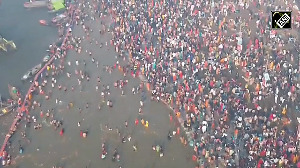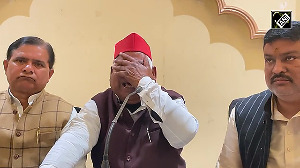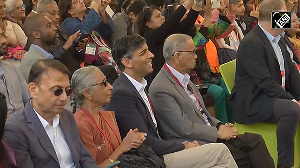Notwithstanding Pakistan being a frontline partner in the war on terror, it remains a major source of Islamic extremism and a safe haven for some top terrorist leaders, the US Department of State's annual compendium of worldwide terrorism has said.
The 2006 Country Reports on Terrorism, released by the office of the coordinator for counterterrorism in the State Department on April 30, said, "The Federally Administered Tribal Areas of Pakistan have become a safe haven for Al Qaeda terrorists and Afghan insurgents since the fall of the Taliban in December 2001."
"Despite Pakistan's efforts to eliminate threats and establish effective governance in the FATA, these tribal areas continued to be terrorist safe havens and sources of instability for Pakistan and its neighbours," the report said.
Meanwhile, it said that three groups based in Pakistan, which the State Department has designated foreign terrorist organisations, namely the Lakshar-e-Tayiba, the Jaish-e-Mohammed, and Harkat ul-Mujahedin, continued its terrorist attacks across the border in India.
The report said the LeT 'has conducted a number of operations against Indian troops and civilian targets in Jammu and Kashmir since 1993,' and recalled that 'the Indian government publicly implicated LeT along with JEM, for the December 2001 attack on Indian Parliament, although concrete evidence is lacking, as well as the July 11, 2006 terrorist train attack in Mumbai.'
"Senior Al Qaeda lieutenant Abu Zubaydah was captured at a LeT safe house in Faisalabad in March 2002, which suggested that some members were facilitating the movement of Al Qaeda members in Pakistan," it added.
The Bush administration report also noted that JeM 'continues to operate openly in parts of Pakistan despite President Musharraf's 2002 ban on its activities. It added that the 'group is well-funded and is said to have thousands of followers who support attacks against Indian targets, the Pakistani government and sectarian minorities.'
The HuM, an Islamic militant group based in Pakistan, is politically aligned with the radical political party Jamiat Ulema-i-Islam's Fazlur Rehman faction and operates primarily in Kashmir, and this group too is linked to Al Qaeda, the report said.
With regard to non-state facilitators as an emerging threat, it said that 'the dismantling of the A Q Khan network revealed an uncomfortable truth about globalization,' and argued that 'the very trends driving globalization -- improved communications and transportation links -- can enable development of extended proliferation networks that may facilitate the terrorist acquisition of weapons of mass destruction.'
"Globalization requires partner nations to work together closely to detect, and disrupt linkages that may develop between terrorists and facilitators such as A Q Khan," the report said.
In the section on India, the report said India's counterterrorism efforts were 'hampered by its outdated and overburdened law enforcement and legal systems.'
"The Indian court system is slow, laborious and prone to corruption; terrorism trials can take years to complete," it complained.
The report bemoaned that many of India's local police forces are 'poorly staffed, trained, and equipped to combat terrorism effectively.'
But it acknowledged that 'despite these challenges, India scored major successes this year (2006), including numerous arrests and the seizure of explosives and firearms during operations against Lashkar-e-Tayiba and other terrorist groups.'






 © 2025
© 2025